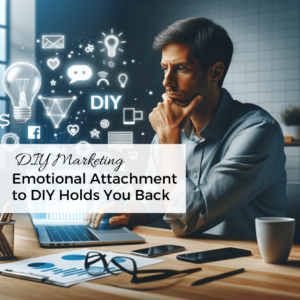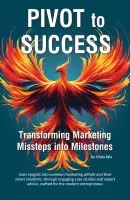Trending Today
Get the Tips: Marketing
for 7-Figure Growth
for 7-Figure Growth
Get solid marketing strategies, designed for entrepreneurs on the track to 7-figures and beyond, right in your inbox.

As an entrepreneur, you’ve likely poured your heart and soul into every aspect of your business. That passion is admirable, yet there’s a thin line where it can become a hindrance, especially when it comes to DIY marketing efforts. Let’s explore why emotional attachment to your marketing strategies, particularly DIY endeavors, might be holding your business back.
I’m a huge fan of entrepreneurs who start their marketing by doing anything, and this often means DIYing some of the initial pieces. Yet I also know, for those businesses who seek to grow to 7-figure years, there comes a time when every entrepreneur needs to bring in a professional, for expert advice. And if you have an emotional attachment instead of a professional one, it can be hard to hear any recommendations they provide.
Picture this: you’ve spent weeks, maybe months, designing your business website. Every pixel reflects your vision and hard work. Naturally, you’re attached to it. It’s your baby.
But, here’s where the waters get murky. This attachment often leads to a kind of tunnel vision. You may start overlooking critical feedback or missing out on growth opportunities simply because they don’t align with your vision.
It’s a common scenario: entrepreneurs clinging to marketing strategies that feel safe and personal, even when they’re not delivering results.
It’s all too easy to fall into the trap of loving what we did, instead of focusing on whether or not the audience will love it. And the audience matters more than you do.
As an example, one client had a super cute font for their headline on their website. But there were a couple of problems. First, they had not installed the font properly on their website, so it wasn’t actually rendering properly for all visitors, and the fallback font clashed a bit with the others. Second, even when viewing the correct font, it was very hard to read – it was a handwriting font that was so flowy and flowery that the visitor had to take more time figuring out what it said that it distracted them from the information they actually needed to see, such as a call to action.
In the case of her flowery font, it took me a while to convince her to make the change; not because it wasn’t the right change to make, but because she was emotionally invested in her choice. (A common argument I hear here is “it reflects my brand”. If you say that to yourself, it should be a red flag, because there is aways more than one way to properly reflect your brand.) Remember how I said when you do it yourself, it’s like it’s your baby? It was her baby. Even though I am always careful and professional during these discussions, almost everyone’s kneejerk reaction is that I said their baby is ugly.
I convinced her to make the change as a one-month test, and in that time her conversions noticeably increased. She kept the change.
A significant motivation for entrepreneurs is the desire to be their own boss, with 26% of entrepreneurs citing this as their primary reason.
When we’re our own boss, we don’t always want someone else telling us what to do!
This drive for independence and control might contribute to an emotional attachment to DIY efforts, including marketing.
Financial constraints are also a significant concern for many entrepreneurs, especially during the critical first five years. About 32% of small business owners report that lack of capital or cash flow is their biggest challenge. This financial pressure might lead entrepreneurs to undertake more tasks themselves, including marketing, to save costs, and can result in fear as a reaction whenever it’s implied that it needs to change.
DIY marketing, at first glance, seems like a cost-effective solution. You save on expenses and maintain full control and it’s something that I speak about frequently.
As I always say, start your marketing with anything, even if it’s not the final polished thing.
This approach can quickly become a trap. The time and effort you invest in trying to master marketing nuances – which is an entirely different skill set than what is likely your own Zone of Genius – could be better spent focusing on your core business strengths.
There’s also the issue of scalability and professional standards. As your business grows, so do its marketing needs. DIY solutions that once seemed sufficient may soon become inadequate, leaving your business struggling to keep up.
The key lies in striking a delicate balance between emotional investment and professional detachment.
Yes, your business is your brainchild, but sometimes (most times), stepping back is necessary for increased growth. It’s about understanding when to take charge and when to seek help.
This isn’t just about delegating tasks; it’s about embracing external perspectives that can bring a fresh, objective viewpoint to your marketing strategies.
Do a gut check. If someone provides feedback that doesn’t match your internal dialog, does it evoke any type of emotion that isn’t positive? Anger, fear, resentment, sadness …
Do I resist changes or suggestions for my marketing strategy? Reflect on whether you find it difficult to accept external advice or alterations to your marketing plans.
Am I overlooking the results (or lack thereof)? Consider if you’re focusing more on the effort you put into your marketing rather than the actual outcomes and results.
Do I feel personally offended by criticism of my marketing materials? Assess if feedback or criticism about your marketing feels like a personal attack.
Am I investing too much time in marketing at the expense of other business areas? Evaluate if your focus on DIY marketing is taking away valuable time from other critical business operations.
Is my attachment based on the effort I put in, rather than the results I get out? Think about whether your attachment is due to the hard work you’ve put in, regardless of whether the strategy is effective.
Have I ignored the latest marketing trends and strategies? Reflect on whether your emotional attachment is preventing you from exploring and adopting new marketing methods. I’m a fan of traditional marketing strategies, but our results continue to improve with newer digital options as well.
Your journey as an entrepreneur is unique and inspiring. But remember, part of this journey is knowing when to let go of certain reins – like your DIY marketing efforts – to pave the way for professional expertise. This shift isn’t just a step towards growth; it’s a testament to your maturity and long-term foresight as a business owner.

Vicky is the CEO and Chief Creative Strategist of Vicky Wu Marketing. She draws from 30 years of experience at the CMO level, the CEO level, marketing for Fortune 500 companies and multi-million and multi-billion-dollar organizations, PLUS strategies learned helping startups and nonprofits with limited budgets … now focusing on providing SMBs with effective and efficient marketing strategies – giving them access to the same level of expertise as the really big guys with deep pockets, that they may not otherwise be able to access.
Get solid marketing strategies, designed for entrepreneurs on the track to 7-figures and beyond, right in your inbox.

